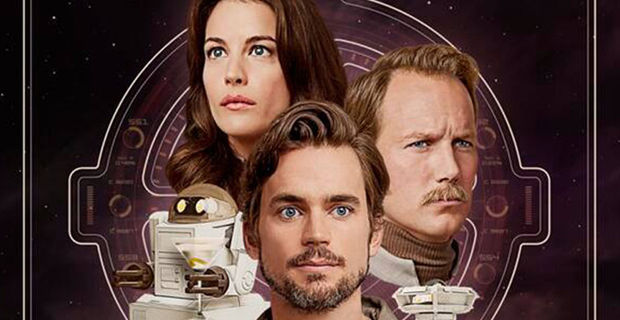Try to quantify a feeling that makes you want to laugh, cry, cringe, and swoon all at the same time.
Now give it a name and tell me what it is so I can use it to describe Space Station 76, a movie that boldly eschews classification to be exactly what it was meant to be.
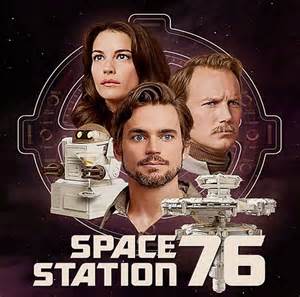 Chances are, if you’ve heard about this movie at all you’ve heard about the fact that it’s set in deep space in the 1970s or that it’s kind of a comedy but kind of not, or that it’s “weird.”
Chances are, if you’ve heard about this movie at all you’ve heard about the fact that it’s set in deep space in the 1970s or that it’s kind of a comedy but kind of not, or that it’s “weird.”
All of these things are very true. But they’re really not the point.
Certainly the weirder elements will make or break the movie for a lot of people, but given how odd the movie can seem on paper (Critically acclaimed dramatic actor in a silly mustache? Check. Lots of digital asteroids? Check. Robotic hand masturbation? CHECK!) the movie itself is remarkably even-handed and tonally consistent.
Director/co-writer Jack Plotnick shows a mastery of mood that’s impressive for anyone, let alone a first time feature director. In a way it’s reminiscent of Ti West’s films, but where West deals in the simplicity of dread, Space Station 76 takes dark comedy, pratfalls, heart-wrenching drama, borderline spoof gags, and the awe of classic space films and weaves them into a cohesive whole, striking complex emotions that defy classification almost as well as the movie itself.
The opening moments show a little girl named Sunshine stepping lightly down a stark white space station hallway.
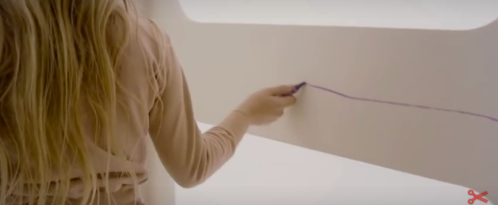 At first the muted colors and use of white negative space might feel like nothing more than a Kubrick homage, but when Sunshine begins to drag a crayon across the wall, leaving a vibrant purple streak in her wake, it becomes clear that even though this (post-)modernist film is completely dependent on many films that came before, it’s still using those elements to make something original.
At first the muted colors and use of white negative space might feel like nothing more than a Kubrick homage, but when Sunshine begins to drag a crayon across the wall, leaving a vibrant purple streak in her wake, it becomes clear that even though this (post-)modernist film is completely dependent on many films that came before, it’s still using those elements to make something original.
Even the little girl’s name, Sunshine, at first seems like a simple “hey look it’s the 1970s!” gag, but as she develops not only as a bright and irrepressibly hopeful character but also as a gravitational point for the various other storylines — all set in the sunless depths of deep space — her name takes on a whole new meaning.
As the film introduces character after character in seemingly random comedic situations, a theme of deep emotional repression begins to develop. Manifested primarily through sexually, these emotions, juxtaposed with the social niceties on display in the space station’s public areas, create a kind of hierarchical Upstairs, Downstairs dynamic within the psyches of all the characters.
In the sexless bedrooms and darkened, tryst-filled supply closets they are one person, but the plastic smile they put on at that evening’s cocktail party suggests someone else entirely.
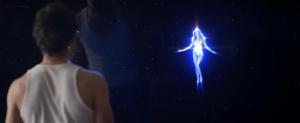 It might be assuming too much of the text, but given the primary storyline revolving around Captain Glenn’s hidden homosexuality and Plotnick (who is openly gay) growing up in the 1970s, it’s not surprising that the crayon that’s used to dash color across the sterile walls happens to be purple.
It might be assuming too much of the text, but given the primary storyline revolving around Captain Glenn’s hidden homosexuality and Plotnick (who is openly gay) growing up in the 1970s, it’s not surprising that the crayon that’s used to dash color across the sterile walls happens to be purple.
And regardless if the color was intentionally symbolic, the image of an innocent child nonchalantly defacing the cold, colorless exterior of an endlessly rotating hallway is just great cinema. It perfectly sets up the rest of the movie while the odd tone and familiar genre elements help ease the metaphor, which could easily be far too preachy.
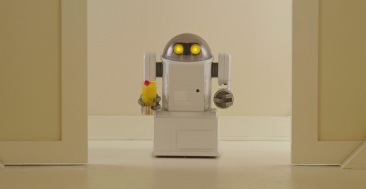 Later in the film we see one of the space station’s robots methodically erasing the crayon marks. This dynamic sums up the movie in just two beats. The childlike desires we express are tidied up and washed away by machinations of our world.
Later in the film we see one of the space station’s robots methodically erasing the crayon marks. This dynamic sums up the movie in just two beats. The childlike desires we express are tidied up and washed away by machinations of our world.
Still later, a similar robot, who throughout the movie serves as an automated psychologist, is revealed to be a fraud, simply programmed to spew out catchphrases when it hears key words. This allows its patient to project whatever faux persona they want and keep their hidden desires buried away, further driving home this theme.
In an interview on The Nerdist Writers Panel, the film is referred to as “Space 1999 meets The Ice Storm” and the description is apt. Despite the injections of comedy and the Sci-Fi setting — which influences the plot at a few brilliant moments but otherwise serves simply as metaphor — this is largely a movie about the the secrets we keep from ourselves and others, how we suppress so much of our humanity for the sake of perceived social values, and how that harmful act is in itself deeply human.
It’s that very paradox that generates the extreme swells of sadness and humor and empathy. Despite the odd setting, it’s possible to see so much of oneself in this film.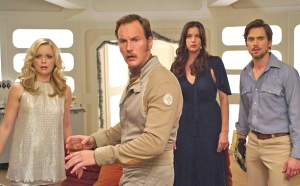
Space Station 76 is a movie all about people who don’t know who they really are, and ironically Plotnick has crafted a gem of a film that knows exactly — almost profoundly — what it is … even if no one else does. It never stops to explain itself with a wink at the audience that says “don’t worry, we know we’re different.” It simply exists without apology, despite existing in a pop culture that often treats art as an absolute and anything that seems different with moralizing disdain.
There’s going to be some film historian or better-than-average movie blogger that will pinpoint the exact moment when we quit loving movies that evoked profound emotions and started demanding that movies tell us how to feel emotions.
That’s not a dig at modern blockbusters or the pre-packaged quirk of “indie” movies, just a realization that while drama demands clarity of character and plot we’ve somehow confused that with the clarity of our own emotional response to the art itself.
And as of writing this, I can’t tell you exactly what I felt while watching Space Station 76, but I can tell you that I felt and what I felt was amazing.
What makes Space Station 76 work so well is not just the long list of fun, surface-level oddities that will keep you standing in front of your DVD collection, wondering if you should file it under Sci-Fi, Drama, Period Piece, or Comedy. What makes it work so well is the powerful human quality that Plotnick and his co-writers brought to the coldness of space and the emptiness of those rotating white hallways.
Space Station 76 is available on iTunes, Amazon, and Netflix DVD.
